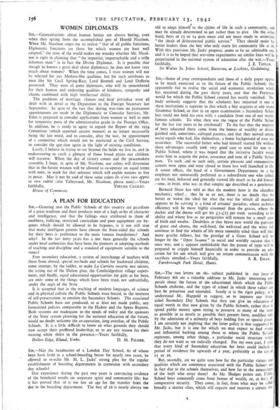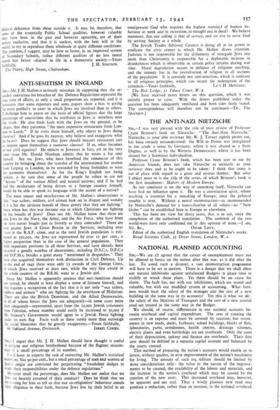Sin,—The two letters on this subject published in our issue
of February 6th are a valuable addition to Mr. Jacks' interesting pro- posals about the future of the educational ideals which the Public Schools enshrine, and the types of school in which these values can best be preserves and extended. Surely it is the right policy, as I understand M. Happold to suggest, so to improve our State- aided Secondary Day Schools that they can give an education of equal worth to that now given by the Public Schools, rather than to spend public money upon trying to preserve as many of the latter as possible in as nearly as possible their present form, modified only by the admission of a minority of boys holding free or special places. I ant certainly not implying that the latter policy is that supported by Mr. Jacks, but it is one for which we may expect to find strong and influential backing among those to whom the Public Schools represent, among other things, a particular social structure which they do not want to see radically changed. For my own part, I wish that every kind of Secondary education for boys could include a period of residence for upwards of a year, preferably at the age of 15 or x6.
But, secondly, are we quite sure how far the particular virtues and qualities which are commonly associated with the Public Schools are in fact due to the schools themselves, and how far to the antecedents of the boi who enter them? As Mr. Hodges points out, Public School boys commonly come from homes of wealth, or, at least, d comparative security. They come, in fact, from what may be taped broadly a master class, which still expects and receives a certain tX ditlonal deference from those outside it. It may be, therefore, that some of the essentially Public School qualities, however valuable they have been in the past and however agreeable,. are of their nature exclusive, and that it is useless, with the best will in the world, to try to reproduce them wholesale in quite different conditions. The problem, I suggest, may be how to foster, in an improved system of Secondary Schools, rather different qualities of no less moral worth but better adapted to life in a democratic society.—Yours faithfully, J. H. SIMPSON. The Priory, High Street, Cheltenham.



























 Previous page
Previous page